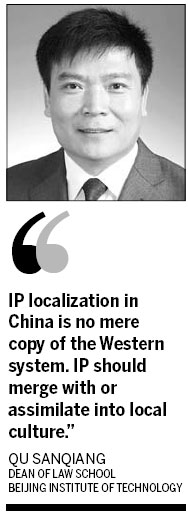China has made long strides in building an intellectual property system, yet its cultural and historical perspective differ profoundly from the West, Qu Sanqiang, the dean of Law School of Beijing Institute of Technology, said in a recent exclusive interview.
His book Intellectual Property Law in China, published by Kluwer Law International last September, is "among the few masterpieces written by Chinese authors in English", said Yang Huaquan, the director of the Copyright Committee at the Beijing Lawyers Association.
Qu told China Daily that the country "has been learning mature practices in IP from developed countries over the past decades, like pupils at class".
"But after three decades of development, I feel that the West may need to listen to what we have done."
Joanne Nagano, vice-president and managing director at Dutch publishing house Kluwer Law, said in an email that "with China's growing prominence in international economic and political spheres, there is widespread interest in the development of intellectual property law in the unique environment".
"Non-China practitioners desire this information to understand the background and the changing legal climate for protection of intellectual property rights in China," Nagano said.
Qu said the country started with passive learning in the very beginning, then matured to strong motivation for increased intellectual property protection as the result of remarkable economic growth.
Cultural perspective
The law school dean noted IP is not indigenous to China. It was first imported in the late Qing Dynasty (1644-1911), not for the country's own needs but due to foreign pressure.
With increasing foreign investment and trade after the Opium Wars, rampant counterfeiting of foreign brands followed, especially in open port cities. As a result, IP concepts were introduced on Chinese soil.

The crumbling royal court also wanted to borrow technological and legal expertise from the West as an attempt to save itself.
"The legal reform had no substantial effect," Qu said. "Yet it did help in ideological enlightenment."
What happened in the early 1980s was in some ways similar. Modern China opened up voluntarily rather than at gunpoint, but "the curtains changed", he said.
Although the beginnings were imported, IP would have developed in China sooner or later once the climate grew mature, said the law expert. Outside pressure might have just accelerated the process, he noted.
IP as a private right is contradictory to Confucian philosophy, which advocates spreading and sharing knowledge, and Marxism's tenets of public ownership.
Yet after assimilation, there is a strong demand for developing IP following technological breakthroughs, robust economic growth and deepening international integration, Qu said.
Personal path
Like the path of IP development in the country, Qu's personal experience was also unusual.
Qu said he "fell into" Peking University in 1977, one of the first 100 or so law students across the country following the "cultural revolution" (1966-76). His education in the previous decade had been as chaotic as the times. "You couldn't find one unbroken windowpane in my high school building," he recalled.
His father had just a three-year primary school education and his mother was almost illiterate, so his entrance to university seemed a miracle.
But he had a love for reading and was "hungry" for anything that he could find to read, he recalled. He was thrilled with a copy of The Story of Sui and Tang Dynasties borrowed from a friend.
Pulling the covers up over his head in bed and using flashlight, he read it behind his parents' backs to cover the "political mistake".
Reading such ancient books without punctuation gave him training. He earned the full score for punctuation in ancient Chinese text in his national university entrance exam.
After four years teaching at Nankai University following graduation, he returned to his alma mater and studied under renowned Chinese criminal law professor Gan Yupei, who had defended Chen Boda, one of the "Gang of Four" leaders responsible for the "cultural revolution".
Qu turned his attention to IP when he studied in Melbourne, Australia for six years, where he received a doctorate in jurisprudence.
While many Chinese academics stay in an "ivory tower" for their entire careers, Qu worked as deputy chief of legal affairs in the Yunnan provincial government for five years starting in 2004.
In addition to other tasks, he was in charge of formulating regulations for protecting the ancient city of Lijiang and new flower varieties grown in Yunnan.
"Government work gave me a new vision to keep a close watch on the operation of our administrative mechanisms and gave me deeper insight for my academic research," he said.
Following a series of previous authoritative publications, his latest book intends to give English-language readers a new perspective, Qu said. "IP localization in China is no mere copy of the Western system. IP should merge with or assimilate into local culture."
[email protected]
(China Daily 01/30/2013 page17)

